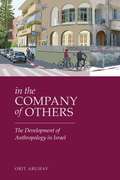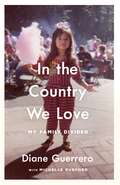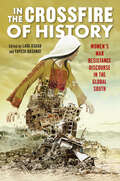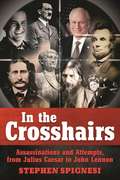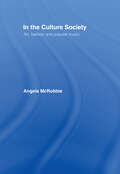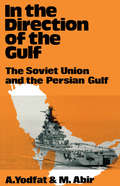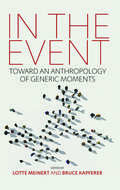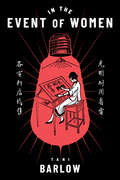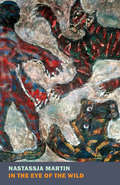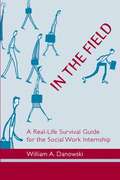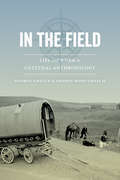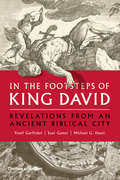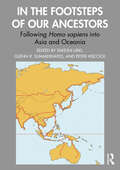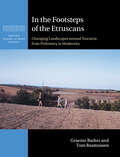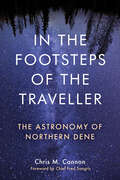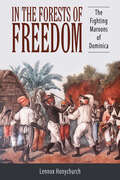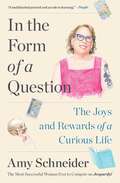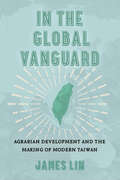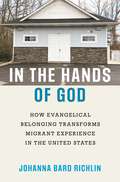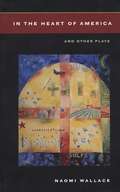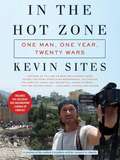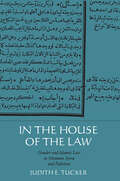- Table View
- List View
In the Company of Others: The Development of Anthropology in Israel (Raphael Patai Series in Jewish Folklore and Anthropology)
by Orit AbuhavIn Israel, anthropologists have customarily worked in their "home"--in the company of the society that they are studying. In the Company of Others: The Development of Anthropology in Israel by Orit Abuhav details the gradual development of the field, which arrived in Israel in the early twentieth century but did not have an official place in Israeli universities until the 1960s. Through archival research, observations and interviews conducted with active Israeli anthropologists, Abuhav creates a thorough picture of the discipline from its roots in the Mandate period to its current place in the Israeli academy. Abuhav begins by examining anthropology's disciplinary borders and practices, addressing its relationships to neighboring academic fields and ties to the national setting in which it is practiced. Against the background of changes in world anthropology, she traces the development of Israeli anthropology from its pioneering first practitioners--led by Raphael Patai, Erich Brauer, and Arthur Ruppin--to its academic breakthrough in the 1960s with the foreign-funded Bernstein Israel Research Project. She goes on to consider the role and characteristics of the field's professional association, the Israeli Anthropological Association (IAA), and also presents biographical sketches of fifty significant Israeli anthropologists. While Israeli anthropology has historically been limited in the numbers of its practitioners, it has been expansive in the scope of its studies. Abuhav brings a firsthand perspective to the crises and the highs, lows, and upheavals of the discipline in Israeli anthropology, which will be of interest to anthropologists, historians of the discipline, and scholars of Israeli studies.
In the Company of Radical Women Writers
by Rosemary HennessyRecovering the bold voices and audacious lives of women who confronted capitalist society&’s failures and injustices in the 1930s—a decade unnervingly similar to our own In the Company of Radical Women Writers rediscovers the political commitments and passionate advocacy of seven writers—Black, Jewish, and white—who as young women turned to communism around the Great Depression and, over decades of national crisis, spoke to issues of labor, land, and love in ways that provide urgent, thought-provoking guidance for today. Rosemary Hennessy spotlights the courageous lives of women who confronted similar challenges to those we still face: exhausting and unfair labor practices, unrelenting racial injustice, and environmental devastation.As Hennessy brilliantly shows, the documentary journalism and creative and biographical writings of Marvel Cooke, Louise Thompson Patterson, Claudia Jones, Alice Childress, Josephine Herbst, Meridel Le Sueur, and Muriel Rukeyser recognized that life is sustained across a web of dependencies that we each have a duty to maintain. Their work brought into sharp focus the value and dignity of Black women&’s domestic work, confronted the destructive myths of land exploitation and white supremacy, and explored ways of knowing attuned to a life-giving erotic energy that spans bodies and relations. In doing so, they also expanded the scope of American communism.By tracing the attention these seven women pay to &“life-making&” as the relations supporting survival and wellbeing—from Harlem to the American South and Midwest—In the Company of Radical Women Writers reveals their groundbreaking reconceptions of the political and provides bracing inspiration in the ongoing fight for justice.
In the Country We Love: My Family Divided
by Diane GuerreroThe star of Orange is the New Black and Jane the Virgin presents her personal story of the real plight of undocumented immigrants in this country. Diane Guerrero was just fourteen years old on the day her parents were detained and deported while she was at school. Born in the U.S., Guerrero was able to remain in the country and continue her education, depending on the kindness of family friends who took her in and helped her build a life and a successful acting career for herself, without the support system of her family. In the Country We Love is a moving, heartbreaking story of one woman's extraordinary resilience in the face of the nightmarish struggles of undocumented residents in this country. There are over 11 million undocumented immigrants living in the US, many of whom have citizen children, whose lives here are just as precarious, and whose stories haven't been told. Written with bestselling author Michelle Burford, this memoir is a tale of personal triumph that also casts a much-needed light on the fears that haunt the daily existence of families likes the author's and on a system that fails them over and over. <br> <b>Winner of the 2017 Alex Award (10 best adult books that appeal to teen audiences)</b>
In the Creole Twilight: Poems and Songs from Louisiana Folklore
by Joshua Clegg CafferyMany of the recurring motifs found in south Louisiana's culture spring from the state's rich folklore. Influenced by settlers of European and African heritage, celebrated customs like the Courir de Mardi Gras and fabled creatures like the Loup-Garou grow out of the region's distinctive oral tradition. Joshua Clegg Caffery's In the Creole Twilight draws from this vibrant and diverse legacy to create an accessible reimagining of the state's traditional storytelling and songs.A scholar and Grammy-nominated musician, Caffery borrows from the syllabic structures, rhyme schemes, narratives, and settings that characterize Louisiana songs and tales to create new verse that is both well-researched and refreshingly inventive. Paired with original pen-and-ink illustrations as well as notes that clarify the origins of characters and themes, Caffery's compositions provide a link to the old worlds of southern Louisiana while constructing an entirely new one.
In the Crossfire of History: Women's War Resistance Discourse in the Global South (War Culture)
by Matthew Spencer Lava Asaad Doaa Omran Farzana Akhter Margaret Hageman Nyla Khan Shafinur Nahar Carolyn Ownbey Moumin Quazi Lucia Garcia-Santana Stefanie SevcikIn the global south, women have and continue to resist multiple forms of structural violence. The atrocities committed against Yazidi women by ISIS have been recognized internationally, and the Nobel Peace Prize awarded to Nadia Murad in 2018 was a tribute to honor women whose bodies have been battered in the name of race, nationality, war, and religion. In the Crossfire of History:Women's War Resistance Discourse in the Global South is an edited collection that incorporates literary works, testimonies, autobiographies, women’s resistance movements, and films that add to the conversation on the resilience of women in the global south. The collection focuses on Palestine, Kashmir, Syria, Kurdistan, Congo, Argentina, Central America, Sri Lanka, and Bangladesh. The essays question historical accuracy and politics of representation that usually undermine women’s role during conflict, and they reevaluate how women participated, challenged, sacrificed, and vehemently opposed war discourses that erase women’s role in shaping resistance movements. The transformative mode of these examples expands the definition of heroism and defiance. To prevent these types of heroism from slipping into the abyss of history, this collection brings forth and celebrates women’s fortitude in conflict zones. In the Crossfire of History shines a light onwomen across the globe who are resisting the sociopolitical and economic injustices in their nation-states.
In the Crosshairs: Famous Assassinations and Attempts from Julius Caesar to John Lennon
by Stephen SpignesiAssassinations often change the course of history. Here is an intriguing look at dozens of notable assassinations and attempts throughout history, including complete details about the assassin, the victim, the circumstances of the attack, and the outcome. In the Crosshairs also features photos of many of the victims or would-be victims, and rare archival material, including excerpts from original police reports.High-profile celebrities, political figures, religious leaders, and many others have fallen prey to assassins, and many have survived. In the Crosshairs is arranged in alphabetical order, by last name, and includes such details as:On November 8, 1939, Adolf Hitler narrowly escaped an assassination attempt - 12 minutes after he left a room where he was making a speech, a bomb went off.Egyptian President Anwar el-Sadat would probably have survived the assassin’s bullet on October 6, 1981, if he hadn’t taken off his bulletproof vest - but he didn’t like the way it made his suit bulge.Robert John Bardo, the murderer of young actress Rebecca Schaeffer, carried with him to the crime scene a copy of J. D, Sallinger’s The Catcher in the Rye, just like Mark David Chapman did when he murdered John Lennon nearly nine years earlier.From notable murders (Abraham Lincoln, Gianni Versace, and Indira Gandhi) to little-known attempts (George W. Bush, Wild Bill Hickock, and Andy Warhol) here is a surprising, informative, and intriguing book that deserves to be on every history buff’s bookshelf.Skyhorse Publishing, as well as our Arcade imprint, are proud to publish a broad range of books for readers interested in history--books about World War II, the Third Reich, Hitler and his henchmen, the JFK assassination, conspiracies, the American Civil War, the American Revolution, gladiators, Vikings, ancient Rome, medieval times, the old West, and much more. While not every title we publish becomes a New York Times bestseller or a national bestseller, we are committed to books on subjects that are sometimes overlooked and to authors whose work might not otherwise find a home.
In the Culture Society: Art, Fashion and Popular Music
by Angela McRobbieHow do different artistic and cultural practices develop in the contemporary consumer culture? Providing a new direction in cultural studies as well as a vigorous defence of the field, Angela McRobbie's new collection of essays considers the social consequences of cultural proliferation and the social basis of aesthetic innovation.In the wake of postmodernism, McRobbie offers a more grounded and even localised account of key cultural practices, from the new populism of young British artists, including Damien Hirst and Tracy Emin, to the underground London sounds of drum'n'bass, discussing music by artists such as Tricky, Talvin Singh and Goldie; from the new sexualities in girls' and women's magazines like More! and Sugar to the dynamics of fashion production and consumption.Throughout the essays the author returns to issues of livelihoods and earning a living in the cultural economy, while at the same time pressing the issue of cultural value.
In the Direction of the Gulf: The Soviet Union and the Persian Gulf
by Aryeh Yodfat Mordechai AbirThis text analyzes the USSR's interest in the countries of the Persian Gulf. The book places such interest within the context of the USSR's relations with the Arab world and the complexities of power politics.
In the Event
by Bruce Kapferer Lotte MeinertEvents are "generative moments" in at least three senses: events are created by and condense larger-scale social structures; as moments, they spark and give rise to new social processes; in themselves, events may also serve to analyze social situations and relationships. Based on ethnographic studies from around the world-varying from rituals and meetings over protests and conflicts to natural disasters and management-this volume analyzes generative moments through events that hold the key to understanding larger social situations. These events-including the Ashura ritual in Bahrain, social cleavages in South Africa, a Buddhist cave in Nepal, drought in Burkina Faso, an earthquake in Pakistan, the cartoon crisis in Denmark, corporate management at Bang & Olufsen, protest meetings in Europe, and flooding and urban citizenship in Mozambique-are not simply destructive disasters, crises, and conflicts, but also generative and constitutive of the social.
In the Event of Women
by Tani BarlowIn the Event of Women outlines the stakes of what Tani Barlow calls “the event of women.” Focusing on the era of the late nineteenth century through the mid-twentieth century's Cultural Revolution, Barlow shows that an event is a politically inspired action to install a newly discovered truth, in this case the mammal origins of human social evolution. Highbrow and lowbrow social theory circulating in Chinese urban print media placed humanity's origin story in relation to commercial capital's modern advertising industry and the conclusion that women's liberation involved selling, buying, and advertising industrial commodities. The political struggle over how the truth of women in China would be performed and understood, Barlow shows, means in part that an event of women was likely global because its truth is vested in biology and physiology. In so doing, she reveals the ways in which historical universals are effected in places where truth claims are not usually sought. This book reconsiders Alain Badiou's concept of the event; particularly the question of whose political moment marks newly discovered truths.
In the Eye of the Wild
by Nastassja MartinAfter enduring a vicious bear attack in the Russian Far East's Kamchatka Peninsula, a French anthropologist undergoes a physical and spiritual transformation that forces her to confront the tenuous distinction between animal and human.In the Eye of the Wild begins with an account of the French anthropologist Nastassja Martin&’s near fatal run-in with a Kamchatka bear in the mountains of Siberia. Martin&’s professional interest is animism; she addresses philosophical questions about the relation of humankind to nature, and in her work she seeks to partake as fully as she can in the lives of the indigenous peoples she studies. Her violent encounter with the bear, however, brings her face-to-face with something entirely beyond her ken—the untamed, the nonhuman, the animal, the wild. In the course of that encounter something in the balance of her world shifts. A change takes place that she must somehow reckon with.Left severely mutilated, dazed with pain, Martin undergoes multiple operations in a provincial Russian hospital, while also being grilled by the secret police. Back in France, she finds herself back on the operating table, a source of new trauma. She realizes that the only thing for her to do is to return to Kamchatka. She must discover what it means to have become, as the Even people call it, medka, a person who is half human, half bear.In the Eye of the Wild is a fascinating, mind-altering book about terror, pain, endurance, and self-transformation, comparable in its intensity of perception and originality of style to J. A. Baker&’s classic The Peregrine. Here Nastassja Martin takes us to the farthest limits of human being.
In the Field
by William A. DanowskiTo help students make the transition from the classroom to the workplace, Danowski (Dominican College) takes the prospective intern through the entire process, from the placement interview to the termination of the client/intern relationship. He provides feedback from former interns and dissects real exchanges between clients and interns. Danowski also cautions students about potential competing political agendas that can arise when working with agencies.
In the Field: Life and Work in Cultural Anthropology
by Prof. George Gmelch Prof. Sharon Bohn GmelchThis book offers students an invaluable look at what cultural anthropologists do when they are in the field. Through fascinating and often entertaining accounts of their lives and work in varied cultural settings, the authors describe the many forms fieldwork can take, the kinds of questions anthropologists ask, and the common problems they encounter. From these accounts and the experiences of the student field workers the authors have mentored over the years, In the Field makes a powerful case for the value of the anthropological approach to knowledge.
In the Footsteps of King David: Revelations From An Ancient Biblical City
by Yosef Garfinkel Saar Ganor Michael G. HaselThe remarkable excavation of a previously unidentified city in Israel from the time of King David, shedding new light on the link between the bible and history King David is a pivotal figure in the Bible, which tells his life story in detail and gives stirring accounts of his deeds, including the slaying of the Philistine giant Goliath and the founding of his capital in Jerusalem. But no certain archaeological finds from the period of his reign or of the kingdom he ruled over have ever been uncovered—until now. In this groundbreaking account, the excavators of Khirbet Qeiyafa in the Valley of Elah, where the Bible says David fought Goliath, reveal how seven years of exhaustive investigation have uncovered a city dating to the time of David— the late eleventh and early tenth century BCE—surrounded by massive fortifications with impressive gates and a clear urban plan, as well as an abundance of finds that tell us much about the inhabitants. Discussing the link between the Bible, archaeology, and history In the Footsteps of King David explains the significance of these discoveries and how they shed new light on David’s kingdom. The topic is at the center of a controversy that has raged for decades, but these findings successfully challenge scholars disputing the historicity of the Bible and the chronology of the events recounted in it.
In the Footsteps of Our Ancestors: Following Homo sapiens into Asia and Oceania
by Peter Hiscock Takeshi Ueki Glenn R. SummerhayesIn the Footsteps of Our Ancestors details through archaeological analysis, the dispersal of our species, Homo sapiens, providing a broad examination of evidence for early human migration into Asia and Oceania. Those migrations are crucial to our understanding of the global story of human evolution and cultural diversification. Chapters from an international team of experts provide the new geographical and temporal coverage. Controversies around timing, pathways, and competing models of migrations are explored in regions where archaeological data can be scarce. Genetic and archaeological data often seem inconsistent, but this book uses syntheses of archaeological evidence to give an updated view of our current knowledge of when and how these regions were first settled. These analyses help us understand the pattern of human movement and adaptation that led to the contemporary distribution of our species. This book provides the latest coverage of this important topic and contributes to thinking about the history of our species.In the Footsteps of Our Ancestors is an essential text for researchers and students of archaeology, anthropology, and human evolution.
In the Footsteps of the Etruscans: Changing Landscapes around Tuscania from Prehistory to Modernity (British School at Rome Studies)
by Graeme Barker Tom RasmussenIn the Footsteps of the Etruscans describes the archaeology of the countryside within a ten km radius of the small town of Tuscania near Rome, throwing light on the unrecorded lives of the generations of farmers and shepherds who have lived there. What was the character of prehistoric settlement prior to Etruscan urbanization? How did urbanization shape the lives of the 'ordinary Etruscans' working the land, hardly ever addressed in Etruscan archaeology? What was the impact on these people of being absorbed into the expanding Roman empire and its globalised economic structures? How did the empire's collapse and the subsequent emergence of the nucleated medieval village affect Tuscania's rural population? The project's 7500-year 'archaeological history', from the first farmers to those grappling with globalisation today, contributes eloquently to our understanding of how Mediterranean peoples have constantly shaped their landscape, and been shaped by it.
In the Footsteps of the Traveller: The Astronomy of Northern Dene
by Chris M. CannonTeachings from the stars Much more than stories about the sky, Indigenous astronomies provide powerful, centuries-old models of knowing, being, and relating to the world. Through collaboration with more than sixty-five Dene Elders and culture bearers across thirty-four communities in Alaska and Canada, In the Footsteps of the Traveller reveals the significance of the stars to Northern Dene life, language, and culture. At the centre of these knowledge systems is the Traveller, a being who journeyed around the world in Ancient Time before incarnating among the stars. The Traveller constellation is a teacher, a gamekeeper, a guardian, and a practical guide for wayfinding. The Traveller, together with a host of other celestial and atmospheric phenomena like thunder and the northern lights, bridges the divide between earth and sky, instilling balance and instructing people on how to live with each other and their environments. This study combines interviews, stunning photographs and detailed illustrations of the northern night sky, author Chris M. Cannon's own experiential learning, and a foreword from Chief Fred Sangris of Yellowknives Dene First Nation. Rooted in years of collaborative fieldwork, In the Footsteps of the Traveller leads the way to deeper understandings of Northern Dene astronomical knowledge.
In the Forests of Freedom: The Fighting Maroons of Dominica (Caribbean Studies Series)
by Lennox HonychurchIn this detailed, brilliantly researched book, historian Lennox Honychurch tells the enthralling and previously untold story of how the Maroons of Dominica challenged the colonial powers in a heroic struggle to create a free and self-sufficient society. The Maroons, runaways who escaped slavery, formed their own community on the Caribbean island. Much has been written about the Maroons of Jamaica, little about the Maroons of Dominica. This book redresses this gap.Honychurch takes the reader deep into the forested hinterland of Dominica to explore the political, social, and economic impact of the Maroons and details their struggles and victories.
In the Form of a Question: The Joys and Rewards of a Curious Life
by Amy Schneider&“Warm and funny.&” —The New York Times * &“Refreshingly no-holds-barred.&” —USA TODAY * &“Delightful.&” —San Francisco Chronicle An inspirational, witty, and bold memoir from the most successful woman ever to compete on Jeopardy!—an exploration of what it means to ask questions of the world and of yourself as well as a passionate &“ode to learning&” (People).In eighth grade, Amy was voted &“Most likely to appear on Jeopardy!&” by her classmates. Decades later, this trailblazer finally got her chance. Not only did she walk away with $1.3 million while captivating the world with her impressive forty-game winning streak, but she made history and won an even greater prize—the joy of being herself on national television and blazing a trail for openly queer and transgender people around the world. Now, she shares her singular journey that led to becoming an unlikely icon and hero to millions. Her superpower: Boundless curiosity and fearless questioning. &“A funny, memorable, philosophical take on life&” (Kirkus Reviews) In the Form of a Question explores some of the innumerable topics that have fascinated Amy throughout her life—books and music, Tarot and astrology, popular culture and computers, sex and relationships—but they all share the same purpose: to illustrate, and celebrate, the results of a lifetime spent asking, why? &“Funny, candid, and confident…this is no ordinary Jeopardy! memoir…[and] Amy Schneider is no ordinary Jeopardy! champion&” (Ken Jennings).
In the Global Vanguard: Agrarian Development and the Making of Modern Taiwan (Asia Pacific Modern)
by Prof. James LinA free ebook version of this title is available through Luminos, University of California Press’s Open Access publishing program. Visit www.luminosoa.org to learn more. In just half a century, Taiwan transformed from an agricultural colony into an economic power, spurred by efforts of the authoritarian Republic of China government in land reform, farmers associations, and improved crop varieties. Yet overlooked is how Taiwan brought these practices to the developing world. In the Global Vanguard elucidates the history and impact of the "Taiwan model" of agrarian development by incorporating how Taiwanese experts took the country’s agrarian success and exported it throughout rural communities across Africa and Southeast Asia. Driven by the global Cold War and challenges to the Republic of China’s legitimacy, Taiwanese agricultural technicians and scientists shared their practices, which they claimed were better suited for poor, tropical societies in the developing world. These development missions, James Lin argues, were projected in Taiwan as proof of the ruling government’s modernity and technical prowess and were crucial to how the state sought to hold onto its contested position in the international system and its rule by martial law at home.
In the Hands of God: How Evangelical Belonging Transforms Migrant Experience in the United States
by Johanna Bard RichlinHow evangelical churches in the United States convert migrant distress into positive religious devotionWhy do migrants become more deeply evangelical in the United States and how does this religious identity alter their self-understanding? In the Hands of God examines this question through a unique lens, foregrounding the ways that churches transform what migrants feel. Drawing from her extensive fieldwork among Brazilian migrants in the Washington, DC, area, Johanna Bard Richlin shows that affective experience is key to comprehending migrants’ turn toward intense religiosity, and their resulting evangelical commitment.The conditions of migrant life—family separation, geographic isolation, legal precariousness, workplace vulnerability, and deep uncertainty about the future—shape specific affective maladies, including loneliness, despair, and feeling stuck. These feelings in turn trigger novel religious yearnings. Evangelical churches deliberately and deftly articulate, manage, and reinterpret migrant distress through affective therapeutics, the strategic “healing” of migrants’ psychological pain. Richlin offers insights into the affective dimensions of migration, the strategies pursued by evangelical churches to attract migrants, and the ways in which evangelical belonging enables migrants to feel better, emboldening them to improve their lives.Looking at the ways evangelical churches help migrants navigate negative emotions, In the Hands of God sheds light on the versatility and durability of evangelical Christianity.
In the Hands of the Senecas (New York Classics Ser.)
by Walter D EdmondsDygartsbush, New York, in the year 1778—smoke rising from lonely cabins, but not the fragrant smoke of cookfires, welcoming the men home from clearing, forest and trail. It was the bitter smoke of charred logs, smoldering in heaps which that morning had been the homes of the settlers—perhaps also the unspeakable smoke of burning flesh, for more than one hundred perished in the flames after his scalp was safely tucked in a raider’s belt.Few men were taken as captives—the women and old children plodded the long trail back to the villages of the Senecas. This is their story, told by the author of Drums Along the Mohawk. It is a story out of New York State History, in which the tales of Walter Edmonds are always steeped. It is a story of Indians—real Indians who are impersonally cruel, simple and friendly, wise, brutal, sly, kind, proud, self-effacing, laughter-loving. It is a story of a woman’s steadfastness in the face of not only mortal danger but of the loss of all that had given her pride and confidence in living.
In the Heart of America and Other Plays
by Naomi WallaceNaomi Wallace's plays speak the underside of life. Her characters suffer and survive against the enormous weight of the times with a dignity that inspires. Her work challenges the audience and reader to reexamine the conflicts and meaning of our everyday lives through her singular, poetic imagery and language.Includes: One Flea SpareIn the Heart of AmericaSlaughter CityThe War BoysThe Trestle at Pope's Creek
In the Hot Zone
by Kevin SitesKevin Sites is a man on a mission. Venturing alone into the dark heart of war, armed with just a video camera, a digital camera, a laptop, and a satellite modem, the award-winning journalist covered virtually every major global hot spot as the first Internet correspondent for Yahoo! News. Beginning his journey with the anarchic chaos of Somalia in September 2005 and ending with the Israeli-Hezbollah war in the summer of 2006, Sites talks with rebels and government troops, child soldiers and child brides, and features the people on every side, including those caught in the cross fire. His honest reporting helps destroy the myths of war by putting a human face on war's inhumanity. Personally, Sites will come to discover that the greatest danger he faces may not be from bombs and bullets, but from the unsettling power of the truth.
In the House of the Law: Gender and Islamic Law in Ottoman Syria and Palestine
by Judith E. TuckerIn an rewarding new study, Tucker explores the way in which Islamic legal thinkers understood Islam as it related to women and gender roles. In seventeenth and eighteenth century Syria and Palestine, Muslim legal thinkers gave considerable attention to women's roles in society, and Tucker shows how fatwas, or legal opinions, greatly influenced these roles. She challenges prevailing views on Islam and gender, revealing Islamic law to have been more fluid and flexible than previously thought. Although the legal system had a consistent patriarchal orientation, it was modulated by sensitivities to the practical needs of women, men, and children. In her comprehensive overview of a field long neglected by scholars, Tucker deepens our understanding of how societies, including our own, construct gender roles.
